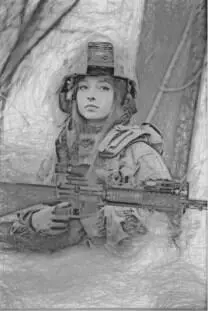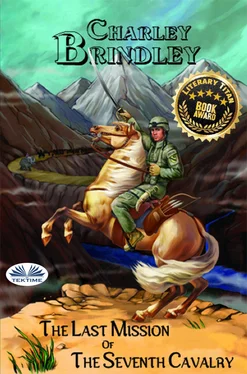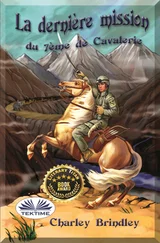Alexander glared at him for a moment. “All right, the only way we’re going to settle this is to find our weapons crate, dig out that toy whirlysplat of yours, and send it up to see where the hell we are.”
“How are we going to find our crate, Sarge?” Lojab asked.
“We’re going to have to find someone who speaks English.”
“Her name is ‘Dragonfly,’” Sparks muttered.
“Hey,” Karina said, “here comes more cavalry.”
They watched two columns of heavily armed soldiers pass on horseback. These horses were larger than any they’d seen so far, and the men wore iron breastplates, along with matching helmets. Their shoulder protection and wrist guards were made of thick leather. Round shields were slung across their backs, and each man carried a long sword, as well as daggers and other knives. Their faces, arms, and legs showed many battle scars. The soldiers rode with bridles and reins, but without stirrups.
It took almost twenty minutes for the cavalry to ride by. Behind them, the trail was empty all the way back to a point where it disappeared around a copse of young Aleppo pine trees.
“Well,” Lojab said, “finally, that’s the last of them.”
Alexander looked down the trail. “Maybe.”
After the passage of forty elephants, hundreds of horses and oxen, and over a thousand people, the trail had been worked down to pulverized dirt.
A horse soldier galloped by on the opposite side of the trail, coming from the front of the column. The platoon watched the rider pull his horse to a skidding halt, then turned to ride beside a man who’d just come around a turn in the trail.
“That must be the guy in charge,” Lojab said.
“Which one?” Karina asked.
“The man who just came around the curve.”
“Could be,” Alexander said.
The man was tall, and he rode a huge black charger. Twenty paces behind him was the tall officer with the scarlet cloak who’d ridden by earlier, and behind the officer rode four columns of horsemen, wearing shiny bronze breastplates and matching helmets. Their scarlet capes fluttered in the breeze.
The man on the warhorse trotted along as the scout spoke to him. He never acknowledged the messenger’s presence but seemed to listen intently to what he had to say. After a moment, the man on the charger said a few words and sent the messenger galloping away toward the front.
When the officer came abreast of the Seventh Cavalry, his horse pranced sideways as both he and his rider studied Sergeant Alexander’s platoon. The officer showed more interest in them than anyone else had.
“Hey, Sarge,” Karina said on her comm, “remember that four-star general who came to Camp Kandahar last month to review the troops?”
“Yeah, that would be General Nicholson.”
“Well, I’ve got a feeling I should come to attention and salute this guy, too.”
The man on horseback sat ramrod straight, and his polished bronze helmet with a red mohawk of boar’s hair on top made him look even taller than his six-foot-two height. He wore a tunic like the others, but his was made of a red silk-like material, and it was sewn with fine double rows of white stitching. The strips of his leather skirt were trimmed in silver, and the hilt of his sword was inlaid with silver and gold, as was the scabbard of his falcata. His boots were made of tooled leather and came up over his calves.
His saddle was covered with a lion hide, and the horse wore a heavy breastplate, along with leather armor on its front legs and a thick silver plate on its forehead. The horse was high-spirited, and the man had to maintain pressure on the reins to restrain him from galloping ahead. A dozen small bells hung along the neck harness, and they jingled as the horse trotted by.
“He does have a certain air of authority,” Alexander said.
“If anyone had stirrups,” Kawalski said, “it should be this guy.”
A scout came galloping down the trail and turned his horse to come up beside the general. With a flick of his wrist, the general turned his warhorse away from the platoon and listened to the scout’s report as they rode away from Alexander and his people. A moment later, the general gave the scout some instructions and sent him off toward the front.
The squadron of horsemen with the red capes showed more interest in Alexander and his troops than the other soldiers did. They were young men, early to mid-twenties, well-dressed, and riding fine horses. They weren’t battle-scarred like the other men.
“They look like a bunch of candy-ass second lieutenants to me.” Lojab spat in the dirt as he watched them.
“Just like cadets fresh out of the academy,” Autumn said.
Behind the cadets came another baggage train of large four-wheeled wagons. The first one was loaded with a dozen heavy chests. The others contained bales of furry hides, spare swords, spears, and bundles of arrows, along with many earthen pots the size of small barrels, filled with dried fruit and grains. Four wagons were loaded high with cages containing geese, chickens, and cooing pigeons. The wagons were pulled by teams of four oxen.
The wagons and carts rode on solid wheels, without spokes.
After the wagons came more two-wheeled carts, loaded with slabs of meat and other supplies. Twenty carts made up this group, and they were followed by a dozen foot-soldiers carrying swords and spears.
“Wow, look at that,” Kawalski said.
The last cart held something familiar.
“They’ve got our weapons container!” Karina said.
“Yeah, and the orange parachutes, too,” Kawalski said.
Alexander glanced at the wagon. “Son-of-a-bitch.” He stepped onto the trail and took hold of the oxen’s harness. “Hold it right there.”
The woman driving the cart glared at him, then popped her whip, cutting a slit in the camo covering of his helmet.
“Hey!” Alexander shouted. “Cut that out. I just want our weapons crate.”
The woman flicked her whip again, and Alexander caught it, wrapping the braided leather around his forearm. He yanked the whip from her hand, then advanced on her.
“I don’t want to hurt you, lady.” He pointed with the handle of the whip toward the fiberglass container. “I’m just taking what belongs to us.”
Before he could get to her, six of the men behind the cart drew their swords and came at him. The first one shoved his fist against Alexander’s chest, pushing him backwards. As Alexander stumbled, he heard twelve rifles being cocked. He regained his balance and held up his right hand.
“Hold your fire!”
The man who had shoved Alexander now pointed his sword at the sergeant’s throat, apparently unconcerned that he might be cut down by the M-4 rifles. He said a few words and tilted his head to the right. It wasn’t hard to understand his meaning; get away from the cart.
“All right, all right.” Alexander held up his hands. “I don’t want you people to die over a weapons container.” As he walked back to his soldiers, he wrapped the whip around its handle and shoved it into his hip pocket. “Lower your weapons, damn it. We’re not going to start a war over that stupid box.”
“But Sarge,” Karina said, “that has all our gear in it.”

“We’ll get it back later. It doesn’t look like they’ve figured out how to open—”
A blood-chilling scream came from the other side of the trail as a band of men armed with spears and swords ran from the woods to attack the baggage train.
“Well,” Lojab said, “this must be Act Two of this never-ending drama.”
As the attackers began grabbing slabs of meat and jars of grain from the wagons, the woman driver on a wagon pulled her dagger and went for two men who’d climbed into her wagon to take the weapons container. One of the men swung his sword, cutting a deep gash in the woman’s arm. She screamed, switched her knife to her other hand, and lunged at him.
Читать дальше













